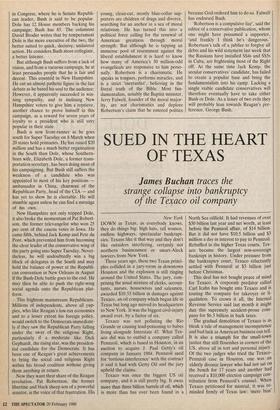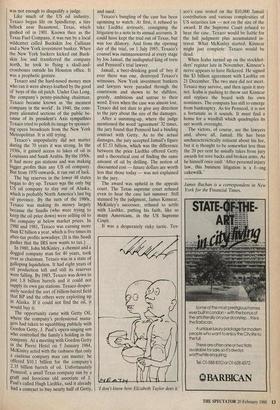SUED IN THE HEART OF TEXAS
James Buchan traces the
strange collapse into bankruptcy of the Texaco oil company
New York DOWN in Texas, as everybody knows, they do things big: high hats, tall women, endless highways, spectacular bankrupt- cies. Texans like it that way and they don't like outsiders interfering, certainly not northern businessmen or smart-Aleck lawyers from New York.
Three years ago, these two Texan princi- ples collided in a jury-room in downtown Houston and the explosion is still ringing around the United States. The jury, com- prising the usual mixture of clerks, accoun- tants, nurses, housewives and salesmen, awarded $10.53 billion in damages against Texaco, an oil company which began life in Texas but long ago moved its headquarters to New York. It was the biggest civil-injury award ever, by a factor of six.
Texaco was not polluting the Rio Grande or causing lead-poisoning to babes living alongside Interstate 45. What Tex- aco did was to outbid a company called Pennzoil, which is based in Houston, in an auction to acquire J. Paul Getty's oil company in January 1984. Pennzoil sued for `tortious interference' with the contract it said it had with Getty Oil and the jury upheld the claims.
Texaco was once the biggest US oil company, and it is still pretty big. It owns more than three billion barrels of oil, which is more than has ever been found in a North Sea oilfield. It had revenues of over $30 billion last year and net worth, at least before the Pennzoil affair, of $14 billion. But it did not have $10.5 billion and $3 million a day in interest to pay to Pennzoil. Rebuffed in the higher Texas courts, Tex- aco 'became the largest non-sovereign bankrupt in history. Under pressure from the bankruptcy court, Texaco reluctantly settled with Pennzoil at $3 billion just before Christmas.
This deal has not bought peace of mind for Texaco. A corporate predator called Carl Icahn has bought into Texaco and is touting the company for takeover or li- quidation. To crown it all, the Internal Revenue Service said last month it might dun this supremely accident-prone com- pany for $6.5 billion in back taxes.
The gradual demolition of Texaco is as bleak a tale of management incompetence and bad luck as American business can tell. It is also a triumph for the small-town justice that still flourishes in corners of the US, above all in tort and personal injury. Of the two judges who tried the Texaco- Pennzoil case in Houston, one was an elderly divorce lawyer who had not sat on the bench for 17 years and another had received a $10,000 election campaign con- tribution from Pennzoil's counsel. When Texaco petitioned for mistrial, it was re- minded firmly of Texas law: 'mere bias' was not enough to disqualify a judge.
Like much of the US oil industry, Texaco began life on Spindletop, a tiny hillock near Beaumont, Texas, which gushed oil in 1901. Known then as the Texas Fuel Company, it was run by a local wildcatter called Buckskin Joe Cullinan and a New York investment banker. When the New York backers kicked out Buck- skin Joe and transferred the company north, he took to flying a skull-and- crossbones outside his Houston office. It was a prophetic gesture. , Texaco and the hard-nosed money men who ran it were always loathed by the good ol' boys of the oil patch. Under Gus Long, the company's penny-pinching chairman, Texaco became known as 'the meanest company in the world'. In 1940, the com- pany alienated sections of the public be- cause of its president's Axis sympathies Texaco tried to polish its image by sponsor- ing opera broadcasts from the New York Metropolitan. It is still trying.
Texaco's unpopularity did not matter during the 70 years it was strong. In the 1930s, it gained access to lakes of oil in Louisiana and Saudi Arabia. By'the 1950s, it had more gas stations and was making bigger profits than any US oil company. But from 1970 onwards, it ran out of luck.
The big' reserves in the lower 48 states began to dry up. Texaco was the only big US oil company to stay out of Alaska, which is probably North America's last big oil province. By the turn of the 1980s, Texaco was making its money largely because the Saudis (who were trying to keep the oil price doWn) were selling oil to the company' at below market prices. In 198Q and 1981, Texaco was earning more than $2 billion a year, which is five times its after-tax profits nowadays. (It is this Saudi gusher that the IRS now wants to tax.) In 1980, John McKinley, a chemist and a dogged company man for 40 years, took over as chairman. Texaco was in a state of galloping liquidation. It had eight years of Oil production left and still its reserves were falling. By 1983, Texaco was down to just 1.8 billion barrels and it could not supply its own gas stations. Texaco desper- ately needed the sort of billion-barrel field that BP and the others were exploiting up in Alaska. If it could not find the oil, it would buy it. The opportunity came with Getty Oil, where the company's professional mana- gers had taken to squabbling publicly with Gordon Getty, J. Paul's opera-singing son who controlled the family's holding in the company. At a meeting with Gordon Getty in the Pierre Hotel on 5 January 1984, McKinley acted with the rashness that only a cautious company man can muster: he offered $10.1 billion for the company's 2.35 billion barrels of oil. Unfortunately Pennzoil, a small Texas company run by a gruff and ferocious old associate of J. Paul's called Hugh Liedtke, said it already had a contract to buy nearly half of Getty, and sued.
Texaco's bungling of the case has been agonising to watch. At first, it refused to take Liedtke seriously, consigning the litigation to a note in its annual accounts. It could have kept the trial out of Texas, but was too dilatory. And from the opening day of the trial, on 1 July 1985, Texaco's counsel was outmanoeuvred at every stage by Joe Jamail, the undisputed king of torts and Pennzoil's trial lawyer.
Jamail, a beer-drinking good ol' boy if ever there was one, destroyed Texaco's witnesses. New York investment bankers and lawyers were paraded through the courtroom and shown to be shiftless, greedy, ambitious and untrue to their word. Even when the case was almost lost, Texaco did not dare to give any direetion to the jury about the size of the damages.
After a summing-up, where the judge mentioned the word 'agreeritent' 32 times, the jury found that. Pennzoil had a binding contract with Getty. , As to the actual damages, the jury accepted Jamail's figure of $7.53 billion, which was the difference between thi price Liedtke offered Getty and a theoretical cost of finding the same amount of oil by drilling. The notion of discounted cost — future dollars are wOrth less that those today -- was not explained to the jury.
The award was upheld in the appeals court. The Texas supreme court refused even to hear the case last summer. Still stunned by the judgment, James Kinnear, McKinley's successor, refused to settle with Liedtke, putting his faith, like so many Americans, in the US' Supreme Court.
It was a desperately risky tactic. Tex- 1 don't know how Elizabeth Taylor does it.' aco's case rested on the $10,000 Jamail contribution and various complexities of US securities law — not on the size of the award. If the Supreme Court refused to hear the case, Texaco would be liable for the full judgment plus accumulated in- terest. What McKinley started, Kinnear might just complete: Texaco would be dead.
When Icahn turned up on the stockhol- ders' register late in November, Kinnear's nerve appears to have flickered. He signed the $3 billion agreement with Liedtke on 21 December. The two men did not meet. Texaco may survive, and then again it may not. Icahn is pushing to throw out Kinnear and replace the board with his own nominees. The company has still to emerge from bankruptcy. As for Pennzoil, it is not a fortunate 'as it sounds. It must find a home for a windfall which quadruples its net worth overnight.
The victors, of course, are the lawyers and, above all, Jamail. He has been uncharacterictically reticent about his fee, but it is thought to he somewhat less than the 20 per cent he usually takes ftom jury awards for sore backs and broken arms. As he himself once said: 'After personal injury law, this business litigation is a f---ing cakewalk.'
James Buchan is a correspondent in Nett' York for the Financial Times.



















































 Previous page
Previous page